By Tadias Staff
Published: Monday, September 1, 2008
New York (Tadias) – When Andarge Asfaw returned to his childhood home, Ethiopia, he had not been there for 27 years. What he experienced and photographed upon his initial return pushed him to get more involved in environmental work, and to use photography as his tool of choice.
Asfaw attended Cornell University and he is a graduate of Hallmark Institute of Photography. His work has been highlighted by Newsweek, Vanity Fair, Esquire and The Washington Post. And recently, his environmentally conscious work was featured by The Valley Advocate. Asfaw works as a professional photographer and currently lectures at the Washington School of Photography, the Art League School and the Metropolitan Center for the Visual Arts.
He spoke with Tadias about his photography career, his trip to Ethiopia and his new book, Ethiopia From The Heart (Cover image above).
Tadias: Let’s start with your career as a Photographer. How did you start?
A. Asfaw: My father was a serious amateur photographer. He gave me my first camera at the age of 12. I adored it. I always knew that I would become a photographer. When I left Ethiopia, I went to England, then the US, where I began my college studies. I continued on to complete my photography education at The Hallmark Institute of Photography. After graduating, I went to New York City and worked in a catalog house. This was an invaluable experience because I learned how to work efficiently since production deadlines were tight. From there, I relocated to Washington, DC and began working in a fast-paced design firm. Eventually, I started my own commercial photography studio in the 80’s, F/STOP STUDIO.
Tadias: What were your early experiences?
A. Asfaw: My father used to show slides of his own images on a large screen. His work showed landscapes and people. They were transporting and powerful. It was something I always looked forward to. Looking at snapshots in daylight cannot compare to a slideshow in the dark. The mood is more dramatic.
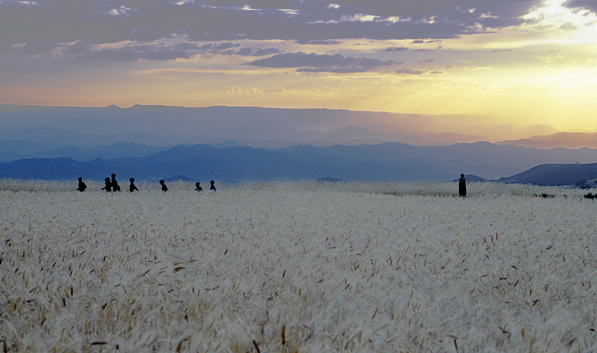
Running Through The Fields. © Andarge Asfaw
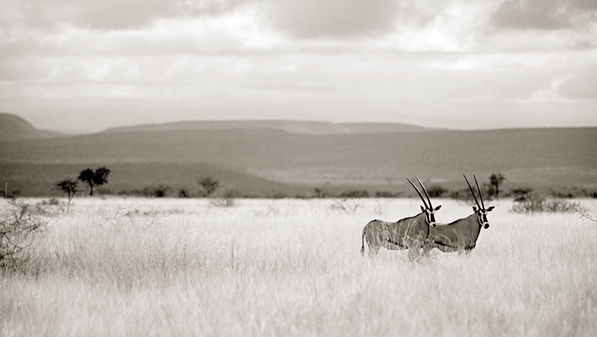
Awash National Park. © Andarge Asfaw
Tadias: The source of the passion?
A. Asfaw: I’ve always been a visual person. I don’t say it in words, I show it. Each time I photograph a subject, I’m looking to preserve it. Later after I see the work, I decide which of these photographs asks to be shared. This urge to photograph, calls me back again and again. This is my creative process.
Tadias: What prompted you to return to Ethiopia? Was there an alternate photography project that you had envisioned before returning?
A. Asfaw: I returned to Ethiopia in 1993. The purpose of my first trip back was to rediscover by myself and to photograph the land and the people as I remembered them from my childhood. I had not been there for 27 years. I have to say, the emotional impact was overwhelming. The country had been ravaged. A lot of the beauty and the magnificence that I remembered had vanished.
Ethiopian culture is rich in tradition. I am thankful that my parents were part of a generation that was strong and dignified. The opportunities and bounty that life offered me then, aren’t available to the youth of today. Even though Ethiopians are humble and respectful of each other, change has affected the whole culture.
Tadias: Please describe your travels in Ethiopia and highlight both the high points and lows of your journey and photographing experience.
A. Asfaw: I can’t say that it wasn’t rough working through all of my feelings of loss for places that were so much a part of my history. However, I returned to Ethiopia several times, not all for personal reasons. I was commissioned in some cases. Certain trips that I made were to help organizations that were fundraising. When you’ve been hired by a client, you approach photography openly. You don’t have the same raw feeling that you get when you’re creating personal work. I was productive during that time for those that I was serving. This was good for me. I grew in strength with each visit back and eventually clarified my goals and was healed. I set out to reveal the beauty of Ethiopia to the world.
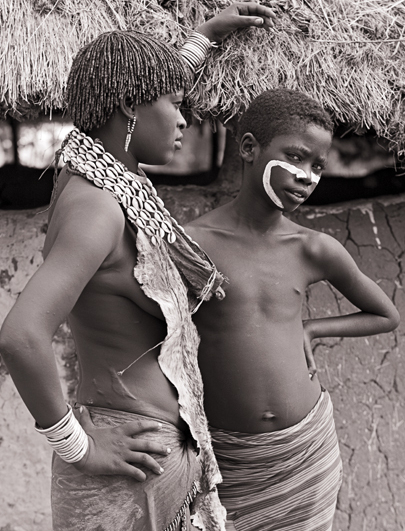
Hamer Siblings. © Andarge Asfaw
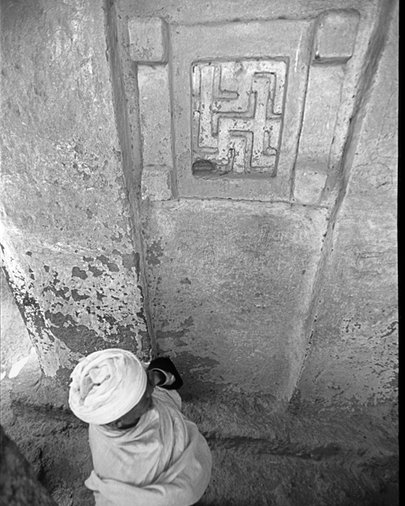
Genet Mariam Church. © Andarge Asfaw
Tadias: You mention that your current book Ethiopia from the Heart reveals the environmental issues that are not usually covered in other photography projects on the region. How will your work bring more needed attention to these concerns?
A. Asfaw: Well, with interviews like these, this is a great start!
Through exhibiting and lecturing about “Ethiopia from the Heart”, I hope to build a community that will support my future efforts to facilitate environmental stewardship in Ethiopia and in everyone’s own backyard. The more recognition the book gets, the stronger the message becomes. Book sales fund tree-planting in Ethiopia through Greener Ethiopia and Trees for the Future.
Tadias: There are no words or descriptions to accompany the photographs in your book? Why did you opt for such a layout?
A. Asfaw: There seems to be a lot of energy around this topic. The title of each image can be found at the back of book. In this information age, we always want to know more – faster. Flipping to the back of the book is slower. What’s the rush? Fine-art is meant to be enjoyed. A lot of photography icons of the past did much of the same. The page layout for “Ethiopia from the Heart” was created by my photo editor and dear friend, Donna T. Jones. Her final decision to have the images unencumbered by text encouraged the fluidity of page movement and kept the design elegant. I loved the final product.
Tadias: You will be exhibiting your current work at the Hallmark Museum of Contemporary Photography in mid-September. Can you tell us a bit more about it?
A. Asfaw: The Hallmark Museum of Contemporary Photography in Turner Falls, Massachusetts, graciously invited me to exhibit my work from “Ethiopia from the Heart”, which explores the richness of Ethiopian landscape, culture and wildlife. There will be a book signing and illustrated artist talk on Saturday, September 13, 2008, beginning at 6:45PM. Book sales fund tree-planting projects in Ethiopia. The Non-Ethiopian community is receiving my work with open arms. I would love to see support from the Ethiopian Community up North at this opening.
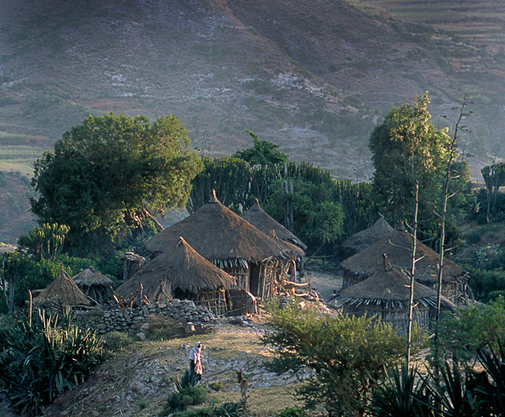
Morning Rays in Tigray Village. © Andarge Asfaw
Tadias: What is the message that you want most to convey to the Ethiopian diaspora? Your photography fans? Environmentalists?
A. Asfaw: I refuse to believe that “we can’t fix what’s been broken”. It will take time and patience, but rejuvenation and change can and will happen in Ethiopia. On the cover of Ethiopia from the Heart, I chose a photograph of a straw flower. In Amharic, Ayderki, which means “everlasting”. That is my true message.
As for my photography followers, many thanks for your praise and encouragement. I especially thank my students for their enthusiasm. “Ethiopia from the Heart” conveys a message that photographers not only document history, they make it. Artists continue to expose the issues and get attention. And for our brothers and sisters in the environmental movement, partner with others to create a stronger network. You all are amazing.
Tadias: What is your next project?
A. Asfaw: Tough question for the diverse amount of subjects calling out to be photographed. But one thing is for sure, I’m not done with Ethiopia, yet. There is another book on the horizon.
—
Digital prints from Ethiopia From the Heart are on display through Sept. 21 at Gallery 85, Hallmark Museum of Contemporary Photography, 85 Ave. A, Turners Falls, Massachusetts, (413) 863-0009. Copies of the book are available at the museum as well as at www.ethiopiafromtheheart.com.
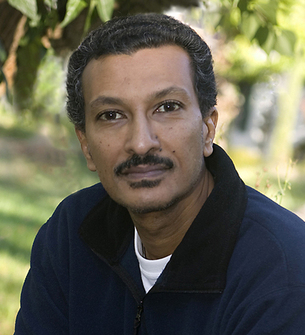
Good job Tadias for this very enlightening piece. Many thanks to Ato Andarge too for bringing out the beauty of our people and country. I hope to see more of your works in the future.
Seleshi
Incredibly nice pictures.
Amazing pictures… so talented. “Running through the fields” is by far my favorite.